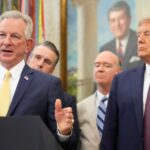

(The Center Square) – Washington ranks 35 out of the 50 U.S. states in Schweitzer Engineering Laboratories’ 2024 Index of Freedom report, which measures government efficiency, regulatory freedom and energy resiliency.
Based in Pullman in eastern Washington, SEL is a global leader in power system protection, automation and control solutions.
The third annual Index of Freedom report uses data from the American Legislative Exchange Council, the ALEC-Laffer State Economic Competitiveness Index, the CATO Foundation, the U.S. Census Bureau, the Bureau of Labor Statistics, and the U.S. Energy Information Administration.
“States are given a score, which is an average of the categories, with the lowest score reflecting the best performance on the Index and the highest score reflecting the worst performance,” the report explains. “Each state is then ranked 1st–50th. All data used in the report are publicly available.”
Washington’s No. 35 overall ranking represents a fall of three spots from last year’s No. 32 position. In 2022, the Evergreen State was ranked No. 36.
Broken down by category, Washington came in at No. 38 in Government Efficiency, 46 in Regulatory Freedom, and 20 in Energy Resiliency.
“Washington has a relatively complex and restrictive regulatory environment that complicates the ability to do business and grow,” the report notes. “Though Washington does not have typical state personal or corporate income taxes, it does levy a 7 percent capital gains tax as well as a gross receipts tax, creating a mixed picture for its state tax structure.”
The capital gains tax was passed by the Legislature in 2021 and withstood a subsequent court challenge to its constitutionality.
It faces another challenge this November in the form of Initiative 2109 to repeal the capital gains tax.
Washington’s business and occupation tax is a gross receipts tax measured on the value of products, gross proceeds of sale, or gross income of the business.
The SEL also mentioned a relatively bright spot in Washington.
“Washington is, however, buoyed by the abundance of affordable, clean, and reliable hydroelectric power, which helps keep the lights on for businesses across the state,” according to the report.
The Center Square reached out to economist Paul Turek with the state Employment Security Department for his take on how Washington fared in this year’s Index of Freedom report.
“I must preface my response by stating I do not endorse nor disavow any of the findings of the SEL report or the reference reports in ALEC from where information was derived,” he said in an email “My comments are limited to the structure of the reports and the economic/political background framing the reports.”
While recognizing the partisan nature of the report, he noted its utility.
“The reports appear to be consistent with stated Republican platforms of lower taxes and regulatory reform,” Turek said. “Washington appears to be interesting to SEL in the sense of energy resiliency, which may be why SEL keeps its headquarters in Pullman.”
He went on to say, “The SEL and ALEC reports, in my opinion, have merit based upon the principles they espouse. They offer businesses an opportunity to determine what business climate might be more beneficial for them for location and relocation purposes.”
Politics, especially during a presidential election year, come into play, he noted.
“The reports also seem to be serving to drive a line between conservative Republican economic principles and more liberal Democratic ones; the latter appearing to be more in favor of raising capital gains and corporate income taxes,” he said. “Washington is singled out by SEL negatively for its gross receipts tax, which is our state’s B&O tax. I don’t think the tax is very popular with the state’s business community and can act as another cost of doing business here. I understand, to some extent, [that] as being a tradeoff for a state that has no personal income tax.”
Turek referenced the presidential race between former President Donald Trump, a Republican, and Vice President Kamala Harris, a Democrat.
“In the end, each person and business has to decide what they find important in order to make their best future decisions whether they be economic and/or political ones,” he said. “We get a chance to test some of this in a couple months.”






